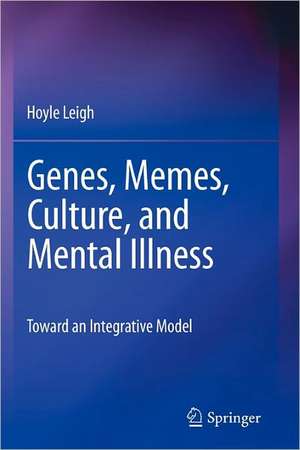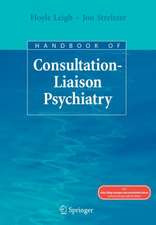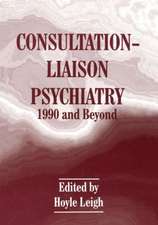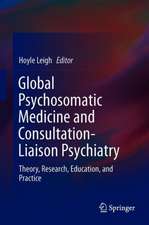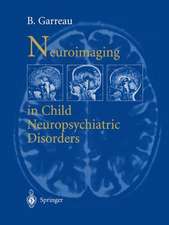Genes, Memes, Culture, and Mental Illness: Toward an Integrative Model
Autor Hoyle Leighen Limba Engleză Paperback – 21 iun 2011
| Toate formatele și edițiile | Preț | Express |
|---|---|---|
| Paperback (1) | 369.65 lei 6-8 săpt. | |
| Springer – 21 iun 2011 | 369.65 lei 6-8 săpt. | |
| Hardback (1) | 912.82 lei 6-8 săpt. | |
| Springer – 19 mai 2010 | 912.82 lei 6-8 săpt. |
Preț: 369.65 lei
Preț vechi: 389.11 lei
-5% Nou
Puncte Express: 554
Preț estimativ în valută:
70.73€ • 74.00$ • 58.76£
70.73€ • 74.00$ • 58.76£
Carte tipărită la comandă
Livrare economică 02-16 aprilie
Preluare comenzi: 021 569.72.76
Specificații
ISBN-13: 9781461402398
ISBN-10: 1461402395
Pagini: 300
Ilustrații: XVIII, 300 p.
Dimensiuni: 155 x 235 x 23 mm
Greutate: 0.44 kg
Ediția:2010
Editura: Springer
Colecția Springer
Locul publicării:New York, NY, United States
ISBN-10: 1461402395
Pagini: 300
Ilustrații: XVIII, 300 p.
Dimensiuni: 155 x 235 x 23 mm
Greutate: 0.44 kg
Ediția:2010
Editura: Springer
Colecția Springer
Locul publicării:New York, NY, United States
Public țintă
Professional/practitionerCuprins
What Is Mental Illness? An Epigenetic Model.- Genes and Mental Illness.- How Does Stress Work? The Role of Memes in Epigenesis.- Culture and Mental Illness.- Genetic–Memetic Model of Mental Illness – Migration and Natural Disasters as Illustrations.- Evolution and Mental Health: Genes, Memes, Culture, and the Individual.- What Do We Inherit from Our Parents and Ancestors?.- Genes.- Evolution.- Learning, Imitation, and Memes.- Storage and Evolution of Memes in the Brain.- External Storage of Memes: Culture, Media, Cyberspace.- Culture and the Individual.- What Is Mental Health?.- What Is Mental Illness?.- Principles of Diagnosis and Treatment of Mental Illness.- Psychiatric Diagnosis: Toward a Memetic–Epigenetic Multiaxial Model.- Memetic Diagnosis, Memetic Assessment and Biopsychosocial Epigenetic Formulation.- Principles of Memetic Therapy.- Broad-Spectrum Memetic Therapies.- Specific Memetic Therapies.- Genetic–Memetic Prevention.- Specific Psychiatric Syndromes.- Overview of Specific Syndromes.- Attention-Cognition Spectrum Syndromes: Delirium, Dementia, Impulse Control Syndromes, ADHD, Antisocial Personality, Obsessive-Compulsive Personality Traits, Obsessive-Compulsive Syndrome.- Anxiety-Mood Spectrum Syndromes: Anxiety, Panic, Phobias, ASD, PTSD, Borderline Syndrome, Dependent and Avoidant Personalities, Social Phobia, Bipolarity and Mania, Depression – Neurotic and Syndromic, Adjustment Disorders.- Reality Perception Spectrum Syndromes (Imagination, Dissociation, Conversion, Somatoform, Misattribution Somatization, Psychosis).- Pleasure Spectrum Syndromes (Substance Use/Abuse, Addictions to Substances and Beliefs, Fanaticism).- Primary Memetic Syndromes: Eating Disorders, Factitious Disorders, Malingering, Meme-Directed Destructive Behaviors.-Challenges for the Future.
Notă biografică
Hoyle Leigh, M.D. is currently Professor of Psychiatry at University of California, San Francisco, and Director of the Psychosomatic Medicine and Psychiatric Consultation-Liaison Program at Fresno Community Regional Medical Center in Fresno, California. He is the author of many professional books and journal articles, including the textbooks, Handbook of Consultation-Liaison Psychiatry, with Jon Streltzer, M.D., and The Patient: Biological, Psychological, and Social Dimensions of Medical Practice, 3rd Edition, with Morton F. Reiser, M.D. and Biopsychosocial Approaches in Primary Care. Prior to joining the faculty at UCSF, Dr. Leigh was Professor of Psychiatry at Yale University School of Medicine, where he founded the pioneering Yale Behavioral Medicine Clinic with Gary Schwartz, Ph.D., as well as directing the basic behavioral science course and the Psychiatric Consultation-Liaison Service at Yale New Haven Hospital. Dr. Leigh received his M.D. degree summa cum laude from Yonsei University School of Medicine in Korea, and completed residency training in psychiatry at University of Kansas Medical Center and the Montefiore Medical Center in New York.
Textul de pe ultima copertă
Genes, Memes, Culture, and Mental Illness: Toward an Integrative Model
Hoyle Leigh
What produces mental illness: genes, environment, both, neither? The question has been asked in various forms, and answers debated, for many centuries. According to a groundbreaking new book, the answer can be found in memes—replicable units of information linking genes and environment in the memory and in culture—whose effects on individual brain development can be benign or toxic.
The latest work from pioneering psychiatrist Hoyle Leigh, Genes, Memes, Culture, and Mental Illness reconceptualizes mental disorders as products of stressful gene x meme interactions, and introduces a biopsychosocial template for meme-based diagnosis and treatment. A range of therapeutic modalities, both broad-spectrum (e.g., meditation) and specific (e.g., cognitive-behavioral), for countering negative memes and their replication are considered, as are possibilities for memetic prevention strategies. With characteristic depth and accessibility, the author:
Hoyle Leigh
What produces mental illness: genes, environment, both, neither? The question has been asked in various forms, and answers debated, for many centuries. According to a groundbreaking new book, the answer can be found in memes—replicable units of information linking genes and environment in the memory and in culture—whose effects on individual brain development can be benign or toxic.
The latest work from pioneering psychiatrist Hoyle Leigh, Genes, Memes, Culture, and Mental Illness reconceptualizes mental disorders as products of stressful gene x meme interactions, and introduces a biopsychosocial template for meme-based diagnosis and treatment. A range of therapeutic modalities, both broad-spectrum (e.g., meditation) and specific (e.g., cognitive-behavioral), for countering negative memes and their replication are considered, as are possibilities for memetic prevention strategies. With characteristic depth and accessibility, the author:
- Outlines the roles of genes and memes in the evolution of the human brain.
- Elucidates the creation, storage, and evolution of memes within individual brains.
- Examines culture as a carrier and supplier of memes to the individual.
- Examines the exchange of memes between the individual and surrounding culture.
- Proposes mental health as a democracy of memes within individual brains.
- Provides specific examples of gene x meme interactions that can result in anxiety, depression, and other disorders.
- Proposes a multiaxial gene x meme model for diagnosing mental illness.
- Details broad-spectrum and specific meme-oriented treatment strategies.
- Identifies areas of meme-based prevention for at-risk children.
- Defines specific syndromes in terms of memetic symptoms, genetic/memetic development, and meme-based treatment.
Caracteristici
Reconceptualizes mental disorders as products of stressful gene-meme interactions Introduces abiopsychosocial template for meme-based diagnosis and treatment of mental illness Details broad-spectrum and specific meme-oriented treatment strategies Enhances theoretical knowledge and daily practice Includes supplementary material: sn.pub/extras
